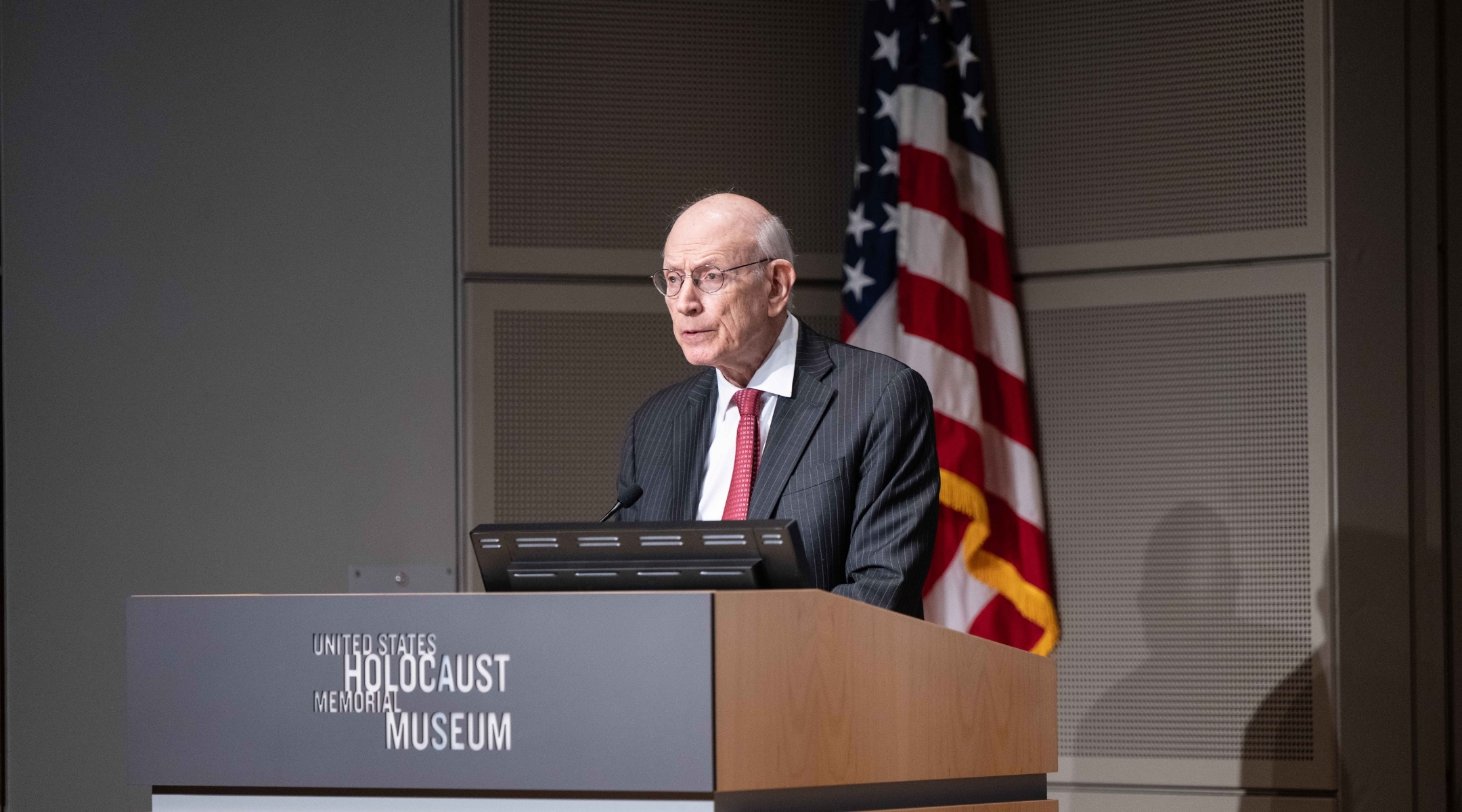21 countries agree to updated guidelines on Nazi-looted art as researchers say much work remains
‘Of the millions of works of art and cultural property stolen by the Nazis, countless objects still have not been returned to their owners,’ Secretary of State Anthony Blinken said in his remarks

Ambassador Stuart Eizenstat, one of the architects of the 1998 Washington Principles, delivers remarks at a 25th anniversary convening. (Courtesy WJRO and Claims Conference)
(JTA) — A conference this week marking 25 years since the adoption of international standards for restituting Nazi-looted artwork presented a new set of best practices on the issue that have been adopted by more than 20 countries.
The best practices, set out by the World Jewish Restitution Organization, or WJRO, and the Conference on Jewish Material Claims Against Germany, aim to “enhance” the 1998 Washington Principles on Nazi-Confiscated Art.
The Washington Principles are a non-binding set of 11 guidelines on how to approach artwork that was stolen from Jews by the Nazis. They were adopted in 1998 by 44 countries and are credited with establishing norms around how countries should work to restitute the stolen pieces. Now, 21 other countries have signed on to the new standards unveiled this week.
In recent years, some of those efforts have paid off, as a swath of Nazi-looted art has been returned to the heirs of the original owners around the globe. But many of those restitutions occurred following court battles, which art provenance researchers say is an inefficient method of restitution that can take years. The issue of Nazi looting also drew attention last year when Christie’s auctioned off much of a large collection jewelry that was linked to Nazi plunder.
But along with the best practices document, the WJRO and Claims Conference published a report detailing the status of arts and cultural property restitution across 47 countries. That report found that while seven countries have made major progress in art and cultural property restitution, 24 countries have made minimal to no progress.
The report also found that relatively significant progress has been made with items held in public collections and museums, but not as much when it comes to items formerly owned by individuals or communities that are now in private hands.
The updated best practices document, presented at a March 5 conference hosted by the WJRO and U.S. State Department, provides a more explicit manual for how countries can implement the original principles without going through the courts.
“The Best Practices were drafted with the awareness that there are differing legal systems and that states act within the context of their own laws,” Stuart Eizenstat, the U.S. Secretary of State’s special advisor on Holocaust issues and a central figure in drafting the original principles, said in a statement. “While they are legally non-binding, they are morally important and, as with the Washington Principles, will advance art restitution.”
The new best practices document, which was introduced by Secretary of State Anthony Blinken in a video address, specifies that works sold under duress during the Holocaust are considered looted or confiscated by the Nazis. It also says governments should encourage provenance researchers to make their findings public their findings, and that institutions should provide access to any relevant archives or documents that could help in provenance work.
The best practices also say governments should create independent expert bodies to adjudicate these cases and avoid litigation, something the Netherlands has done in recent years. And the document says countries should make it easier legally for works that are hanging in state-owned and private collections to be returned to their original owners or their descendants.
“Of the millions of works of art and cultural property stolen by the Nazis, countless objects still have not been returned to their owners,” Blinken said in his remarks. “Today, too many governments, museums, dealers, galleries and individuals still resist restitution efforts, while heirs confront staggering legal and financial barriers as they go up against opponents whose resources vastly outmatch their own.”
Provenance researchers and scholars in the field of stolen art spoke about the progress they have seen over the past 25 years, and also proposed alternative approaches to restitution that address many claims at once, as opposed to case-by-case lawsuits to restore stolen works.
“I believe that the next 25 years we will be slowly moving away from individualists’ private property paradigm envisioned in the Washington Principles,” said Leora Bilsky, legal scholar and professor at Tel Aviv University. “If we keep on dealing only with a one-by-one property, honestly, we are not going to get to a solution and the time is running and it is important to think of more structural solutions.”
This article originally appeared on JTA.org.
A message from our Publisher & CEO Rachel Fishman Feddersen

I hope you appreciated this article. Before you go, I’d like to ask you to please support the Forward’s award-winning, nonprofit journalism so that we can be prepared for whatever news 2025 brings.
At a time when other newsrooms are closing or cutting back, the Forward has removed its paywall and invested additional resources to report on the ground from Israel and around the U.S. on the impact of the war, rising antisemitism and polarized discourse.
Readers like you make it all possible. Support our work by becoming a Forward Member and connect with our journalism and your community.
— Rachel Fishman Feddersen, Publisher and CEO





























